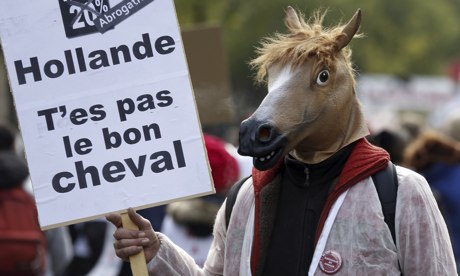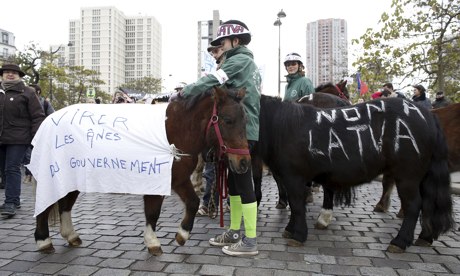Pro-slaughter people talk about a huge market for horse meat in France, so why did thousands of French people ride their horses to the capital of Paris to oppose a new tax hike which they say will send 80,000 horses to the slaughter house? Yes, they are worried about all the jobs that will be lost, but they also say they care about what will happen to all the horses. ~Declan
French horse riders take tax protest on to streets of Paris
François Hollande's plan to treble VAT on equestrian centers will 'send 80,000 horses to the abattoir', warns industry

A demonstrator holds a placard reading 'Hollande you are not the right horse' at Sunday's protest in Paris. Photograph: Thomas Samson/AFP/Getty Images
A French mood of mutiny that has rippled through Brittany and infected teachers, farmers and shopkeepers, skipped species on Sunday when horses took to the streets of Paris to complain about tax rises.
Thousands of disgruntled horse and pony riders rode through the French capital to complain about tax increases they say will put many of them out of business and send 80,000 animals to the abattoir.
The "cavaliers" blocked roads from the symbolic Paris squares, Place d'Italie, Place de la Bastille and Place de la Nation, in protest at government plans to almost treble VAT on equestrian centres.
It was the latest manifestation of the growing revolt over PresidentFrançois Hollande's tax reforms, many of them aimed at reducing the country's public deficit to meet European Union demands.
 Horses in Paris during the demonstration against the proposed raising of VAT)for equestrian centres. Photograph: Thomas Samson/AFP/Getty Images
Horses in Paris during the demonstration against the proposed raising of VAT)for equestrian centres. Photograph: Thomas Samson/AFP/Getty Images
The country has been beset by protests in recent weeks by workers including teachers, ambulance staff, farmers, shopkeepers and lorry drivers.
Hollande is France's least popular leader since 1958, according to opinion polls, caught between pressure from Brussels and the anger of a population already hit with one of world's highest tax burdens.
Inhabitants of Brittany, in north-west France, who claim they are bearing the brunt of company closures, layoffs and tax rises, are symbolic of the spirit of mutiny sweeping the country.
Tens of thousands of protesters wearing revolutionary-era "bonnets rouges" have clashed with police, promising to make the region Hollande's "cemetery".
The caps are reminiscent of a 17th-century revolt against Louis XIV's stamp tax in Brittany and became one of the official emblems of the 1789 revolution.
Breton protesters against the Ecotax, nicknamed the '"lorry tax", aimed at making heavy goods vehicles pay for polluting the environment through additional road levies, have destroyed more than 46 traffic radars. The damage is estimated at more than €6m (£5m), according to TV channel France 3.
On Thursday, French farmers brought traffic in Paris to a crawl as they drove tractors on to main roads into the capital to protest about changes in the European Common Agriculture Policy that would increase subsidies for livestock farmers to the detriment of those producing cereals.
Farmers' associations are also angry at the imposition of higher VAT on fertiliser and at new anti-pollution laws, which they claim would curtail their use of tractors.
Thierry Merret, the president of the FDSEA farming union in Finistère, said the government "understood nothing" and that "decisions are being made by Parisians who know nothing about the realities and needs" of those in Brittany.
"We ask them for concrete responses on the question of employment and preserving industrial activity, they reply with talk about helping staff deal with redundancy," he told centre-right newspaper Le Figaro.
The increase in VAT on equestrian centres from 7% to 20% has been imposed on France by an European commission directive that has the backing of the European court of justice. French equestrian associations want the directive renegotiated.
Serge Lecomte, the president of the Fédération Française d'Équitation, told journalists: "The situation is exceptional. The whole sector is now in danger."
Lecomte said the VAT increase would lead to the closure of 2,000 horse centres out of 7,000 with a loss of 6,000 jobs out of 40,000, in the next 18 months. "It will send 80,000 horses to the abattoir," he said.
France has about 700,000 horse-riding instructors and 2.3 million people who ride, 82% of them women. It is the third most popular sport in France.
The government has promised subsidies to prevent riding schools from going under, but Lecomte said this was not a solution.
"Today we're one of the rare sports which is self-financing. To change this and become dependent on subsidies to function is neither enviable or possible," he said.
The French sports minister, Valérie Fourneyron, has voiced sympathy with the equestrian lobby, agreeing that the government needs to renegotiate the European directive.
She added: "But this negotiation is not for the short term. In the meantime we will do all we can in conjunction with the sector to ensure the impact of the VAT [rise] is limited."
No comments:
Post a Comment